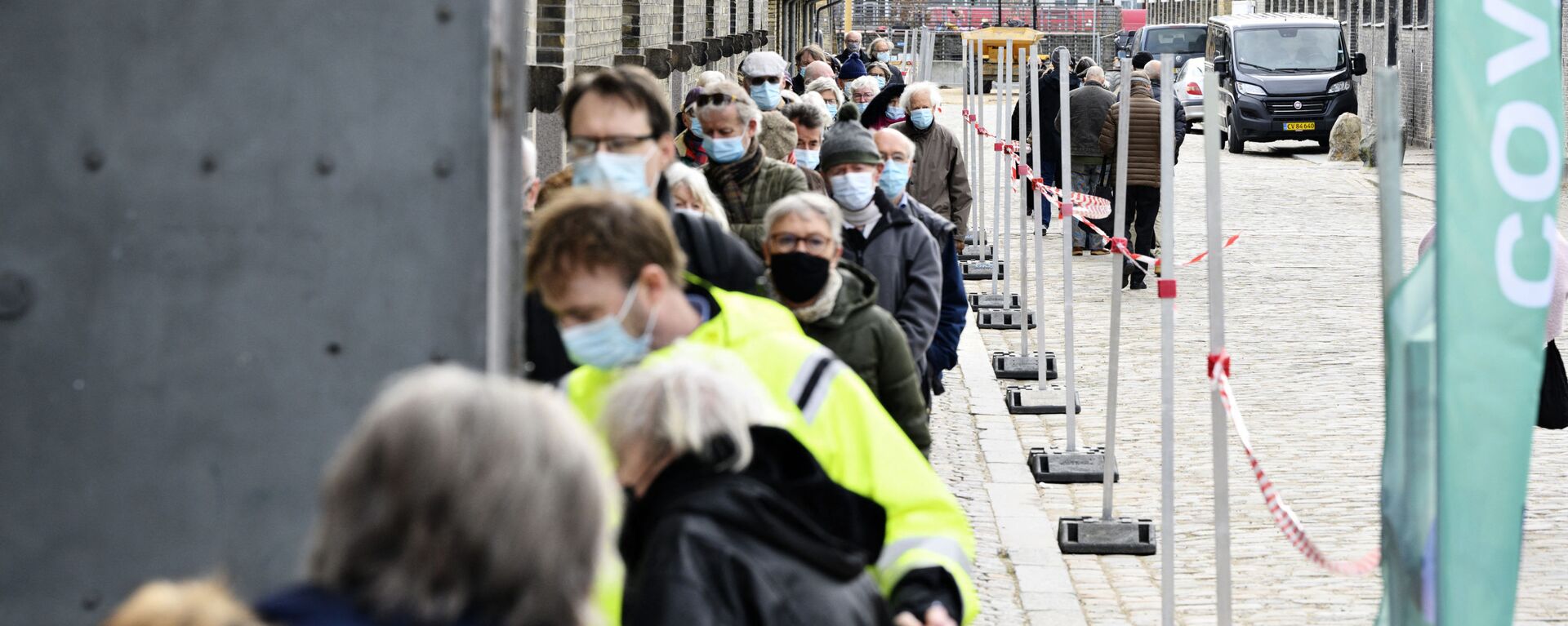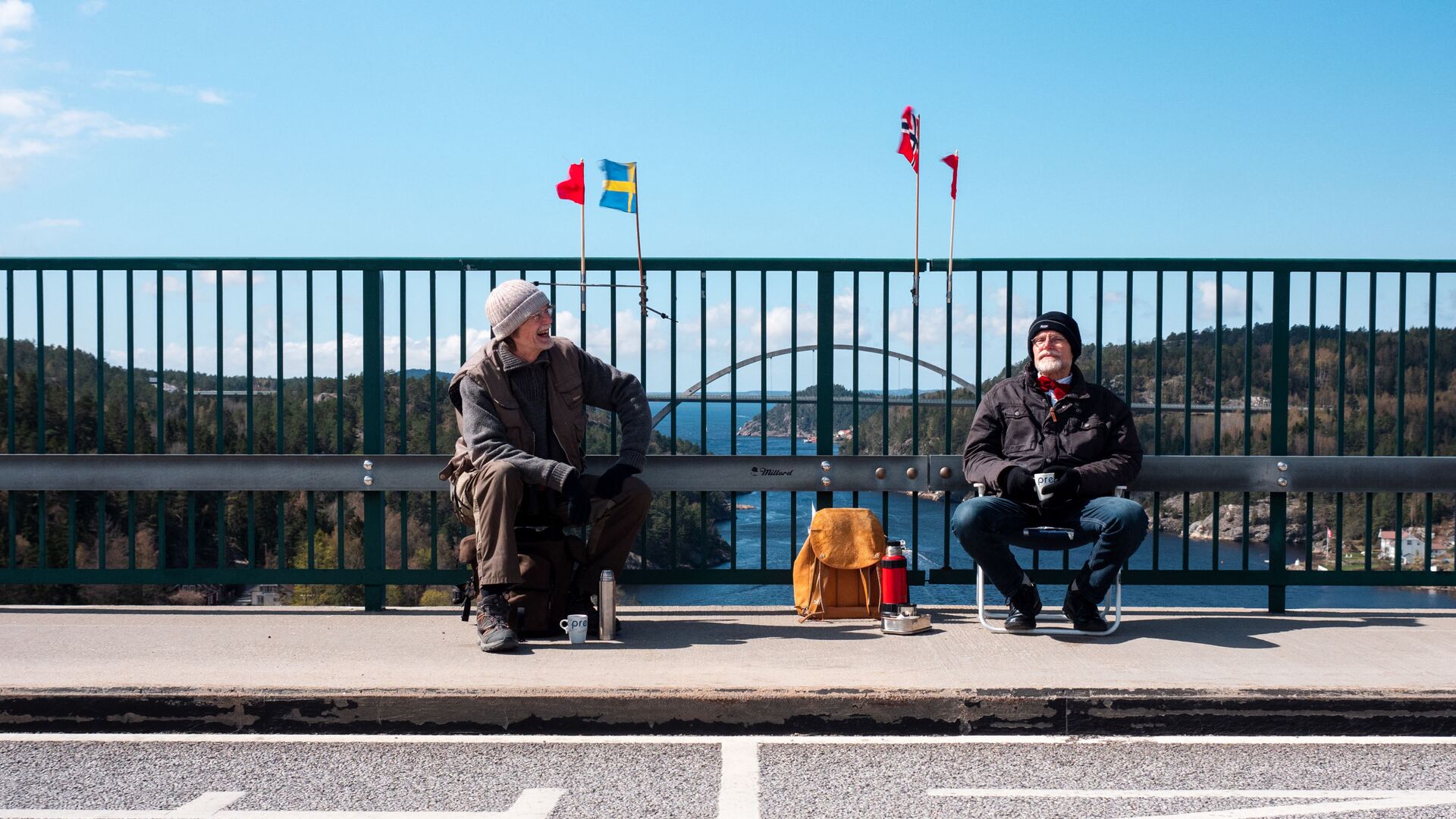https://sputnikglobe.com/20220127/why-is-norway-saying-its-best-to-be-infected-sooner-and-due-to-reopen-despite-record-covid-rates-1092545550.html
Why Is Norway Saying It's Best to Be Infected Sooner and Due to Reopen Despite Record COVID Rates?
Why Is Norway Saying It's Best to Be Infected Sooner and Due to Reopen Despite Record COVID Rates?
Sputnik International
Norway's recent push toward reopening has been described as “striking a balance between how much risk one is willing to take and how large a burden on... 27.01.2022, Sputnik International
2022-01-27T05:41+0000
2022-01-27T05:41+0000
2022-01-27T05:41+0000
omicron covid strain
denmark
newsfeed
europe
norway
scandinavia
covid-19
omicron strain
https://cdn1.img.sputnikglobe.com/img/07e5/07/13/1083412149_0:0:2867:1614_1920x0_80_0_0_b35c7d23228ee1f0739f6c2d5f9d89ef.jpg
The National Institute of Public Health (FHI) has estimated that the majority of Norwegians will have been infected by the summer and argued that it is better to get the virus now rather than later.In line with this approach, an extensive easing of anti-COVID measures is planned starting from next week. In a new risk analysis, the FHI estimated that wholly 3-4 million of the country's 5.3 million inhabitants may be infected by June (in addition to the 666,000 infected so far). While between 12,000-13,000 people may need hospital care, no more than 175 patients will require respirator care, the analysis said. The current Omicron wave is expected to peak sometime in the second half of February or the beginning of March.At the same time, Healthcare Minister Ingvild Kjerkol said that the government is planning a massive relief of COVID-19 prevention measures starting from next week as the country appears to “tolerate more infection”. The FHI concurred that most measures can be gradually phased out in a short time. Measures that have the greatest impact on children and young people should be removed first, it said. Camilla Stoltenberg described it as a striking a balance between how much risk one is willing to take and how large a burden on healthcare one can handle.The FHI also listed several things that should be taken into account in Norway's continued pandemic management. First, the current set of measures restricts human freedom. Second, even more comprehensive measures would be required to curb the more infectious, yet milder Omicron strain. Third, a strong slowdown in the pandemic merely postpones the problem, whereas avoiding becoming infected is difficult. Fourth, thanks to broad vaccine coverage and the availability of boosters, the risk of serious illness and death is lower now, it concluded.FHI furthermore identified some key principles for the pandemic's management. Above all, society should return to a normal everyday life as soon as possible, and the disease will be managed through recommendations and rules of life – not laws and regulations. Lastly, COVID-19 should no longer be classified as a generally dangerous infectious disease.The easing of restrictions is being proposed despite a massive infection cycle, as the Nordic nation has broken several daily records in recent weeks. The latest record of 24,530 was hit over the past 24 hours, NRK reported. A similar approach is being carried out in Denmark, which announced the removal of restrictions despite towering infection rates.
https://sputnikglobe.com/20220125/hopes-of-herd-immunity-resurrected-as-denmark-ravaged-by-omicron-strain-1092498134.html
denmark
norway
scandinavia
Sputnik International
feedback@sputniknews.com
+74956456601
MIA „Rossiya Segodnya“
2022
News
en_EN
Sputnik International
feedback@sputniknews.com
+74956456601
MIA „Rossiya Segodnya“
Sputnik International
feedback@sputniknews.com
+74956456601
MIA „Rossiya Segodnya“
denmark, newsfeed, europe, norway, scandinavia, covid-19, omicron strain
denmark, newsfeed, europe, norway, scandinavia, covid-19, omicron strain
Why Is Norway Saying It's Best to Be Infected Sooner and Due to Reopen Despite Record COVID Rates?
Norway's recent push toward reopening has been described as “striking a balance between how much risk one is willing to take and how large a burden on healthcare one can handle”. Its key principles include returning to normal life as soon as possible, and managing the disease through recommendations and rules, not laws and regulations.
The National Institute of Public Health (FHI) has estimated that the majority of Norwegians will have been infected by the summer and argued that it is better to get the virus now rather than later.
In line with this approach, an extensive easing of anti-COVID measures is planned starting from next week.
In a new risk analysis, the FHI estimated that wholly 3-4 million of the country's 5.3 million inhabitants may be infected by June (in addition to the 666,000 infected so far). While between 12,000-13,000 people may need hospital care, no more than 175 patients will require respirator care, the analysis said. The current Omicron wave is expected to peak sometime in the second half of February or the beginning of March.
“The way the situation is in Norway, we have a population that has recently received the third dose and has good protection against illness and hospitalisation,” FHI Director General Camilla Stoltenberg told national broadcaster NRK. “Therefore it is better to be infected when you are in that situation than when the vaccine effect goes down a bit,” she explained.
At the same time, Healthcare Minister Ingvild Kjerkol said that the government is planning a massive relief of COVID-19 prevention measures starting from next week as the country appears to “tolerate more infection”. The FHI concurred that most measures can be gradually phased out in a short time. Measures that have the greatest impact on children and young people should be removed first, it said. Camilla Stoltenberg described it as a striking a balance between how much risk one is willing to take and how large a burden on healthcare one can handle.
The FHI also listed several things that should be taken into account in Norway's continued pandemic management. First, the current set of measures restricts human freedom. Second, even more comprehensive measures would be required to curb the more infectious, yet milder Omicron strain. Third, a strong slowdown in the pandemic merely postpones the problem, whereas avoiding becoming infected is difficult. Fourth, thanks to broad vaccine coverage and the availability of boosters, the risk of serious illness and death is lower now, it concluded.
FHI furthermore identified some key principles for the pandemic's management. Above all, society should return to a normal everyday life as soon as possible, and the disease will be managed through recommendations and rules of life – not laws and regulations. Lastly, COVID-19 should no longer be classified as a generally dangerous infectious disease.

25 January 2022, 06:47 GMT
The easing of restrictions is being proposed despite a massive infection cycle, as the Nordic nation has broken several daily records in recent weeks. The latest record of 24,530 was hit over the past 24 hours, NRK
reported. A similar approach is being carried out in Denmark, which announced the removal of restrictions despite towering infection rates.



